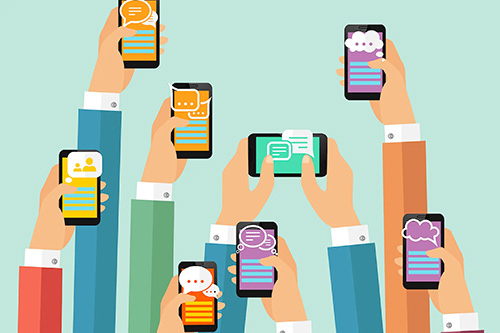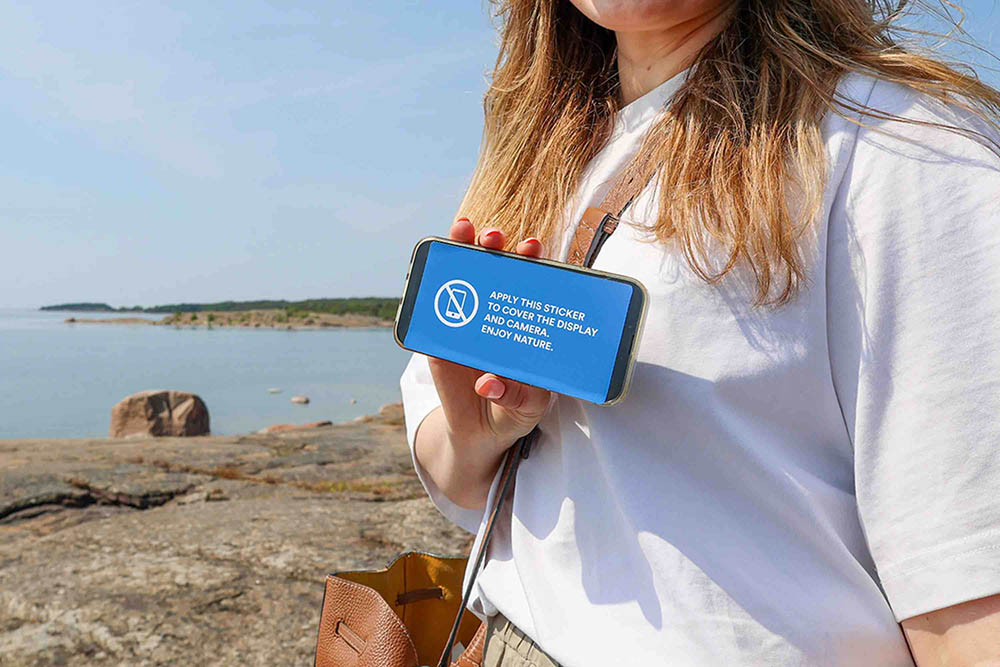Challenge for 2024:
A Balanced Digital Life
As we look to another year of creating for (and competing in) the digital space, we want to be mindful. High on our radar are 3 things:
- Nielsen research quantifying the 11 hours per day Americans spend listening to, watching, reading, or interacting with media1
- A recent Harris Poll revealing that most adults “would like to return to a time before humanity was plugged in (a full 8 in 10 adults aged 35-54, and 6 in 10 adults aged 18-34)”2
- Rising sales of feature-less “flip phones” to U.S. Gen Zers looking to reduce screen time3

Not only are consumers yearning for a “less is more” digital existence, but we’ve seen evidence of users actively cutting back on social by reducing time spent or abandoning apps altogether, in the name of self-preservation.4
Research has linked a reduction in screen time to a reduction in symptoms of depression. By unplugging, we can curb the anxiety that accompanies FOMO (fear of missing out) and feelings of low self-worth linked to constantly comparing ourselves to others. In doing so, we have an opportunity to improve sleep, focus, productivity, and time to connect to people and passions.5
For us, the topic is controversial. With many budgets dedicated to digital…what can we do as brands?
Promote Digital Wellness
First, we can help consumers be more conscious of their technology use and encourage them to take a breather. As brands, we can aim for moments in time…seizing opportunities to redirect the experience. Here are some examples over the past decade:

- AT&T’s “Put Down the Phone” Holiday Campaign, encouraging consumers to put down their devices and ‘give the present of being present’6
- Chick-fil-A Family Challenge, providing a cell phone coop to hold family phones in order to enjoy a distraction-free meal7
- London’s Meantime Brewing Company, requiring guests to hand over mobile phones before entering the pop-up bar8
- Finland’s Ulko-Tammio island, branding itself as “the first phone-free tourist destination”9
- Arizona’s Castle Hot Springs, encouraging guests at the all-inclusive resort to limit their Wi-Fi connectivity10
Rebalance the Media Mix
Second, we can reflect on social participation. While brands like Lush Cosmetics, Balenciaga, and Bottega Veneta have opted out – ceasing to post on Meta platforms,11 or walking away from social completely12…we think there is a logical, and less radical approach, e.g., rebalancing the media mix.
We hope the above motivates you to think deeply – not only about consumer’s digital wellness, but your own. We wish for you a 2024 with less screen time, and more life in full color.
[1] “How to Do a Digital Detox”, verywellmind.com, 10/31/23
[2] “Gen Xers and older millennials really just want to go back in time to before the internet existed”, Fast company, 6/14/23
[3] “Dumb phones are on the rise in the U.S. as Gen Z looks to limit screen time”, CNBC, 3/29/23
[4] “Quitting Twitter? What People Say About Life After Social Media”, WSJ, 5/01/22
[5] “5 Reasons You Should Unplug from Social Media”, CNET, 3/07/23
[6] “AT&T Urges Customers to Put Away Their Cellphones – But Just for a Day”, Vox, 12/26/15
[7] “Chick-fil-A cellphone challenge aims to reclaim family mealtime”, Mashable, 3/02/16
[8] “How brands are tapping into the trend for a digital detox”, econsultancy.com, 2/22/17
[9] “Tech-free destinations”, Wunderman Thompson, 8/28/23
[10] “10 Remote Hotels and Resorts Designed for Unplugging”, Condé Nast Traveler, 5/04/21
[11] “Why your favorite brand may be taking a social media break”, BBC, 7/12/23
[12] “Life after likes: will more brands follow Lush in going anti-social?”, PR Week, 1/04/23

